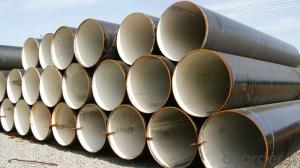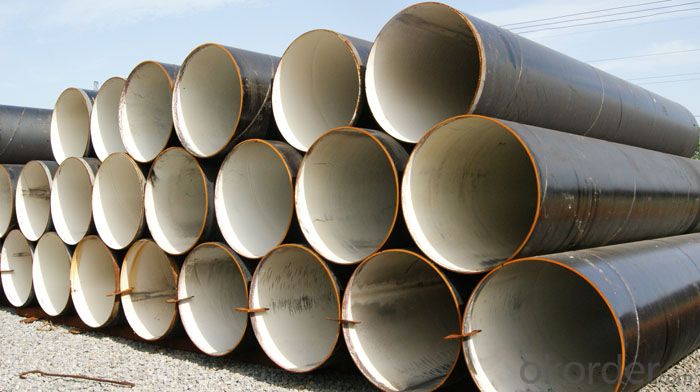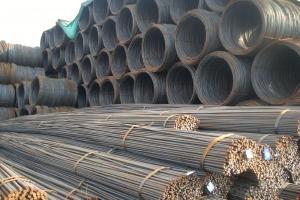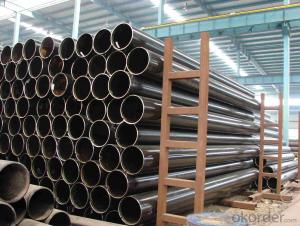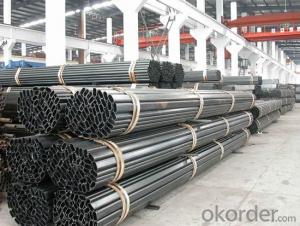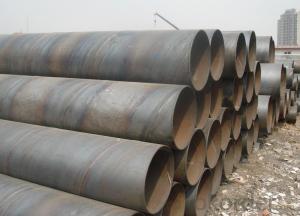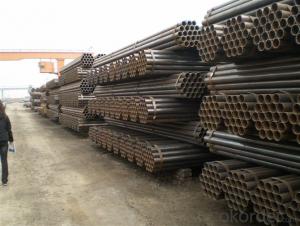The welded steel pipe production serious
- Loading Port:
- Tianjin
- Payment Terms:
- TT OR LC
- Min Order Qty:
- 25 m.t.
- Supply Capability:
- 8000 m.t./month
OKorder Service Pledge
OKorder Financial Service
You Might Also Like
1、Structure of the welded steel pipe A106/53:
The welded steel pip is formed by drawing a solid billet over a piercing rod to create the hollow shell. We can provide you any size of pipe according to your require,and our clients have been included all over the world.
2、Main Features of welded steel pipe A106/53:
• Higher strength
• Small inertia resistance
• Powerful heat dissipation ability
• Better visual effect
• Much reasonable price
3、Welded steel pipe ASTM A106/53 Specification:
Standard | GB, DIN, ASTM ASTM A106-2006, ASTM A53-2007 |
Grade | 10#-45#, 16Mn 10#, 20#, 45#, 16Mn |
Thickness | 8 - 33 mm |
Section Shape | Round |
Outer Diameter | 133 - 219 mm |
Place of Origin | Shandong, China (Mainland) |
Secondary Or Not | Non-secondary |
Application | Hydraulic Pipe |
Technique | Cold Drawn |
Certification | API |
Surface Treatment | factory state or painted black |
Special Pipe | API Pipe |
Alloy Or Not | Non-alloy |
Length | 5-12M |
Outer Diameter | 21.3-610mm |
Grade | 20#, 45#, Q345, API J55, API K55, API L80, API N80, API P110, A53B |
Standard | ASME, ASTM |
1) About the material:20#(ASTM A 106/A53 GRB.API5LGRB,GB),45#,16Mn,10#.
2) Specification range:OD:21.3-610mm,WT:6-70mm,length:6-12m or according to the requirement of clients.
3) Excutive standards:GB,ASME API5L.ASTM A 106/A53,Despite of the above standards,we can also supply seamless steel pipe with standard of DIN,JIS.We can produce pipe according to custom require.
4) Surface:black lacquered,varnish coating or galvanized.
5) Ends:Beveled or square cut,plastic capped,painted.
4、Packaging & Delivery information
Packaging Details: | seaworthy package,bundles wrapped with strong steel strip |
Delivery Detail: | 15-30days after received 30%TT |
5、FAQ about welded steel pipe ASTM A106/53:
①How about the price?
Yes, we are factory and be able to give you lowest price below market one, and we have a policy that “ for saving time and absolutely honest business attitude, we will give you best price and best quality, we sure that we can make you satisfy about the price of our pipe.
②How is the quality of your products?
We test many times till all the production can meet the standard, we will make sure the quality and give all customs best guaranteed.
Guaranteed: If products’ quality don’t accord to discription as we give or the promise before you place order, we promise 100% refund.
How about price?
③Why should you chose us?
Chose happens because of quality, then price, We can give you best quotation and best quality of production and to meet all your demand, third party inspection is no problem.We have professional sales and engineering team, we sure that we can meet your demand.
6、welded steel pipe ASTM A106/53 Images:
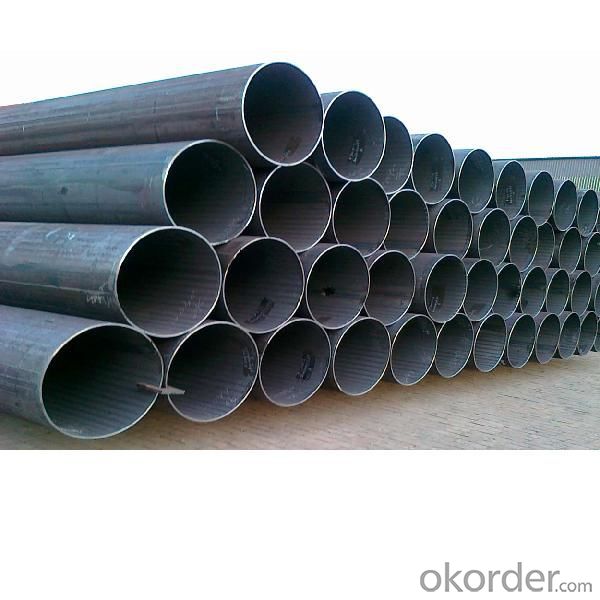
- Q: Can steel pipes be used for HVAC systems?
- Yes, steel pipes can be used for HVAC systems. Steel pipes are commonly used for HVAC systems due to their strength, durability, and resistance to extreme temperatures. They are suitable for transporting air, water, and refrigerants, making them a reliable choice for HVAC installations.
- Q: Which is more load-bearing, the same thickness of steel pipe and steel bar?
- The magnitude of the axial force acting on the steel member is only related to three factors, namely, the strength of the material, the sectional area of A and the longitudinal stability factor of F.
- Q: What are the specific differences between flexible pipes and rigid pipes?
- Watch from outside:The rigid waterproof sleeve is made up of steel bushing and wing ring, and the structure is simple;The flexible waterproof sleeve mainly consists of flange sleeve, sealing ring, flange, pressure plate, wing ring, bolt and nut. The structure is complicated.
- Q: What is the standard length of steel pipes?
- The standard length of steel pipes can vary depending on the application and industry, but commonly they are available in lengths of 20 feet or 6 meters.
- Q: What is the maximum allowable deflection for steel pipes?
- The maximum allowable deflection for steel pipes is typically determined by industry standards and design codes. These standards and codes specify the acceptable limits of deflection to ensure the structural integrity and functionality of the pipes. The maximum allowable deflection varies depending on various factors such as the pipe diameter, wall thickness, material properties, and the type of application. It is important to consult the relevant standards and codes, such as the American Society of Mechanical Engineers (ASME) B31.3 code for process piping or the American Water Works Association (AWWA) standards for water transmission and distribution pipes, to determine the specific maximum allowable deflection for a particular steel pipe application. Following these guidelines helps to ensure the safe and efficient operation of steel pipes in various industries and applications.
- Q: What does the diameter of a steel pipe project mean?
- Nominal surface meaning can be understood as a public address. It's as if everyone agreed to call something as a "devil", and he was the devil.Don't be confused by the numbers behind the nominal diameter. For example, DN50, this 50 is really close to the outer diameter or inside diameter of the steel tube, but DN50 is only a general model of the caliber of the national standard.
- Q: Can steel pipes be coated for aesthetic purposes?
- Yes, steel pipes can be coated for aesthetic purposes. Coating steel pipes not only adds a visually appealing finish but also provides protection against corrosion and other environmental factors. There are various coating options available for steel pipes, such as powder coating, epoxy coating, and vinyl coating, among others. These coatings can be applied in different colors and textures to enhance the appearance of the pipes and complement the surrounding environment. Whether in industrial settings, architectural projects, or decorative applications, coating steel pipes can transform them into visually appealing elements while maintaining their structural integrity.
- Q: How are steel pipes used in the construction of water supply systems?
- Steel pipes are commonly used in the construction of water supply systems due to their durability, strength, and resistance to corrosion. These pipes are used to transport water from the source to various points of distribution, such as buildings, homes, and industries. Steel pipes are often buried underground or installed above ground, depending on the specific requirements of the project. Additionally, steel pipes can withstand high pressure and are suitable for carrying large volumes of water, making them a reliable choice for water supply systems.
- Q: What are the different methods of pipe welding for steel pipes?
- Steel pipes can be welded using various methods, each with its own advantages and applications. Here are some commonly used techniques: 1. Stick welding, also called Shielded Metal Arc Welding (SMAW), involves manually melting a consumable electrode coated in flux. The flux creates a protective shield around the weld pool. SMAW is versatile and can be used in different positions, making it suitable for both field and workshop applications. 2. Gas Metal Arc Welding (GMAW), also known as MIG welding, uses a continuous wire electrode fed through a welding gun. The gun supplies a shielding gas, such as argon or a mixture of argon and carbon dioxide, to protect the weld pool from contamination. GMAW is known for its high welding speed and is commonly used in industrial settings. 3. Flux-Cored Arc Welding (FCAW) is similar to GMAW, but the wire electrode is filled with flux instead of relying on an external gas. The flux creates a protective shield around the weld pool, eliminating the need for a separate gas supply. FCAW is often used in outdoor and windy conditions for better protection against contamination. 4. Gas Tungsten Arc Welding (GTAW), also called TIG welding, uses a non-consumable tungsten electrode to create the weld. A separate shielding gas, typically argon, is used to protect the weld pool. GTAW produces high-quality welds with excellent control, making it suitable for precision applications. 5. Submerged Arc Welding (SAW) is an automated process that uses a continuously fed wire electrode and a granular flux poured over the weld joint. The arc is submerged beneath the flux, providing excellent protection against contamination. SAW is commonly used in heavy fabrication and pipeline industries due to its high deposition rates and deep penetration capabilities. These are just a few of the methods available for welding steel pipes. The choice of method depends on factors such as the application, material thickness, desired weld quality, and available equipment. Selecting the appropriate method is crucial to ensure strong and reliable welds in steel pipe applications.
- Q: What are the different methods of pipe joining using steel pipes?
- There are multiple ways to connect steel pipes, each with its own pros and cons. 1. Threaded and coupled: This method includes threading the ends of the steel pipes and using couplings to connect them. It is a cost-effective option, but not suitable for high-pressure or gas applications. 2. Welding: Welding is a popular choice for joining steel pipes. It involves heating the pipe ends and fusing them together through welding. This method creates a strong and leak-proof joint, but it requires skilled labor and can be time-consuming. 3. Grooved: This method involves grooving the ends of the steel pipes and connecting them using mechanical couplings or fittings. It is a reliable and fast option suitable for both high and low-pressure applications, but it requires specialized tools and equipment. 4. Flanged: Flanged joints connect steel pipes using flanges, which are discs with bolt holes. The pipes are aligned and bolted together with gaskets to ensure a secure connection. This method is commonly used for large pipes and high-pressure applications, but it can be expensive and time-consuming to install. 5. Compression: Compression fittings are used to join steel pipes by compressing a ferrule or sleeve against the pipe. This method is quick, easy, and doesn't require special tools. However, it is not suitable for high-pressure or high-temperature applications. 6. Brazing: Brazing involves heating the pipe ends and melting a filler material between them to create a joint. It is a reliable method for HVAC and refrigeration systems, but it requires skilled labor and precise temperature control. When selecting the appropriate method for joining steel pipes, it is crucial to consider the specific requirements of the application, such as pressure, temperature, and material compatibility.
Send your message to us
The welded steel pipe production serious
- Loading Port:
- Tianjin
- Payment Terms:
- TT OR LC
- Min Order Qty:
- 25 m.t.
- Supply Capability:
- 8000 m.t./month
OKorder Service Pledge
OKorder Financial Service
Similar products
Hot products
Hot Searches
Related keywords
